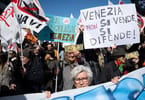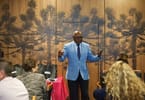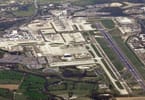The dire impact numbers, prepared for the Njem US Association by Tourism Economics, were presented by U.S. Travel Association President and CEO Roger Dow at a Tuesday White House meeting with President Trump, Vice President Pence, Commerce Secretary Wilbur Ross and other travel leaders.
A new analysis released Tuesday by the U.S. Travel Association projects that decreased travel due to coronavirus will inflict an $809 billion total hit on the U.S. economy and eliminate 4.6 million travel-related American jobs this year.
Dow kwuru na Tuesday, "Nsogbu ahụike ejirila ọha na gọọmentị anya n'ụzọ ziri ezi, mana ọdachi na-akpata maka ndị were ọrụ na ndị ọrụ adịlarị ma na-akawanye njọ," Dow kwuru na Tuesday. "Azụmahịa ndị metụtara njem na-ewe ndị America nde 15.8, ma ọ bụrụ na ha enweghị ike ịkwụ ụgwọ ọkụ ha, ha enweghị ike ịnọgide na-akwụ ndị ọrụ ha ụgwọ. Na-enweghị usoro enyemaka enyemaka mberede na ngwa ngwa, usoro mgbake ga-adị ogologo ma sie ike karị, na ọkwa dị ala nke ọkwa akụ na ụba ga-enwe mmetụta kachasị njọ na ya. "
Dow kwuru na 83% nke ndị were ọrụ njem bụ obere azụmaahịa.
Nchọpụta ndị ọzọ pụtara ìhè na nyocha mmetụta njem:
- Total spending on travel in the U.S.— transportation, lodging, retail, attractions and restaurants—is projected to plunge by $355 billion for the year, or 31%. That is more than six times the impact of 9/11.
- Atụmatụ mfu nke ụlọ ọrụ njem naanị dị oke oke iji kwanye US n'ime nlaazu nlaazu - nke a na-atụ anya na ọ ga-adị ma ọ dịkarịa ala ụzọ atọ, ebe Q2 2020 bụ ebe dị ala.
- Atụmatụ ọrụ nde 4.6 metụtara njem ga-, n'onwe ha, ihe fọrọ nke nta ka ọ bụrụ okpukpu abụọ nke enweghị ọrụ US (3.5% ruo 6.3%).
Dow kwuru, "Ọnọdụ a bụ kpam kpam na-enweghị usoro mbụ." "N'ihi ahụike ahụike ogologo oge nke akụ na ụba, ndị ọrụ na ndị ọrụ chọrọ enyemaka ugbu a site na ọdachi a nke ọnọdụ kpatara kpamkpam na-enweghị nchịkwa ha."
Na nnọkọ White House nke Tuesday, Dow gbara ndị nchịkwa ume ka ha tụlee $ 150 ijeri na enyemaka zuru ezu maka mpaghara njem sara mbara. N'ime usoro atụnyere:
- Wụpụta ego nkwụsi ike ndị ọrụ njem
- Nye akụrụngwa Liquidity ihe mberede maka azụmaahịa njem
- Bulite ma gbanwee mmemme mbinye ego SBA iji kwadoo obere azụmaahịa na ndị ọrụ ha.
Worst of Travel Jobs Catastrophe Will Hit in Next Two Months
Coronavirus will cost the U.S. travel sector 4.6 million jobs by the end of April, according to updated analysis released Wednesday by the U.S. Travel Association.
Earlier projections released by U.S. Travel foretold catastrophic losses of $355 billion and 4.6 million travel-related jobs this year.
But the latest data shows that $202 billion in direct travel spending and all 4.6 million jobs will disappear before May.
The numbers highlight the need for aggressive and immediate action by the federal government, travel leaders say. The non-airline travel sector is seeking $250 billion in disaster relief to avoid putting millions of Americans out of work.
“The news we have for policymakers and the public is very challenging: the 15.8 million American jobs supported by travel are directly in the crosshairs of the health crisis, and the only thing that’s going to protect them is aggressive financial relief right now,” said U.S. Travel President and CEO Roger Dow, who on Tuesday presented the economic impact projections and the travel industry’s relief request to President Trump and Vice President Pence at a White House meeting.
Dow continued: “There are countless stories of travel businesses—83% of which are small businesses—working hard to do right by their workers. But the cold reality is they can’t support their employees if they don’t have any customers, and they don’t have any customers because of the actions needed to halt the spread of coronavirus. Millions of Americans shouldn’t have to lose their jobs by acting in the interest of public health.
“We’re witnessing the shutdown of travel. The economic effects of that are already disastrous, but could become worse and permanent unless the government acts now.”
Relief measures requested by U.S. Travel on behalf of the industry include:
- Establish a $250 billion Travel Workforce Stabilization Fund to keep workers employed.
- Provide an Emergency Liquidity Facility for travel businesses to remain operational.
- Bulk up and streamline the SBA loan programs to support small businesses and their employees.
pịa ebe a to read the full economic impact report.























